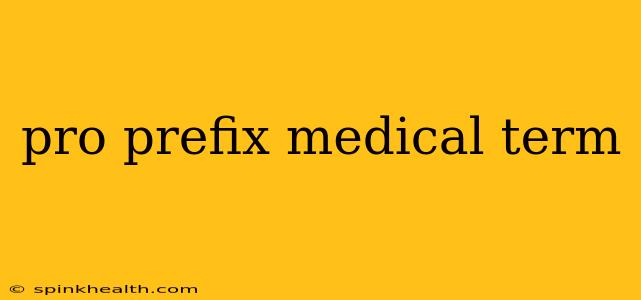Decoding the "Pro-" Prefix in Medical Terminology: A Journey Through the Body
The human body is a marvel of intricate systems, and understanding its complexities often requires deciphering medical terminology. One common prefix that frequently appears in medical terms is "pro-," which carries a specific meaning and helps us understand the location, function, or relationship of various anatomical structures and processes. Let's embark on a journey to unravel the mysteries of the "pro-" prefix in the world of medicine.
My name is Dr. Eleanor Vance, and I've spent years working in medical research and education. This knowledge allows me to share insights into the intricacies of medical terminology, making it accessible and understandable for everyone.
What Does "Pro-" Mean in Medical Terms?
In medical terminology, the prefix "pro-" typically means "before," "in front of," or "forward." It indicates the position or direction of something relative to another anatomical structure. Think of it as a directional marker within the body's map. This seemingly simple prefix opens up a world of understanding when used in combination with other medical terms.
Common Medical Terms with the "Pro-" Prefix
Let's explore some examples to illustrate the meaning and usage of "pro-" in various medical contexts:
-
Prolapse: This term refers to the falling or slipping down of an organ from its normal position. For example, uterine prolapse describes the descent of the uterus into the vagina. The "pro-" indicates that the organ is moving forward or downward from its usual location.
-
Prognosis: While not directly related to anatomical location, "prognosis" refers to the prediction of the likely course and outcome of a disease. It literally means “knowing beforehand” – predicting the future of a medical condition.
-
Prothrombin: This is a protein involved in blood clotting. While not directly using "pro-" to denote location, the "pro" in prothrombin indicates a precursor to thrombin, an essential enzyme for blood coagulation. It's a protein that precedes the final active enzyme.
-
Pronation: This refers to the rotation of the forearm, turning the palm downwards. The "pro-" implies the movement of the palm forward or downward. The opposite, supination, sees the palm upwards.
-
Prostate Gland: Located in front of (pro-) the rectum, this gland plays a crucial role in the male reproductive system. The prefix accurately reflects its anatomical position.
Frequently Asked Questions about the "Pro-" Prefix
Here are some frequently asked questions regarding the "pro-" prefix in medical terms:
1. What is the difference between "pro-" and other prefixes with similar meanings?
While "pro-" often indicates "before" or "in front of," other prefixes can have overlapping meanings. For example, "ante-" also signifies "before" but may refer to time or position. "Pre-" similarly denotes "before" and often describes a stage in a process, such as "preoperative" (before surgery). Careful distinction between these prefixes is crucial for precise medical communication.
2. Are there any exceptions to the general meaning of "pro-"?
As with many prefixes, context is key. While "pro-" predominantly implies "before," "in front of," or "forward," it is crucial to consider the root word to determine its precise meaning in a specific term. The examples of prognosis and prothrombin highlight how the prefix's meaning can adapt based on the entire word.
3. How can I learn more about medical prefixes and suffixes?
There are many excellent resources available to expand your understanding of medical terminology. Medical dictionaries, online resources, and textbooks dedicated to medical terminology offer structured learning, while flashcards and practice quizzes can aid memorization and comprehension.
Understanding medical prefixes like "pro-" is a crucial step in comprehending complex medical information. By understanding its directional and temporal implications, you can gain a more profound appreciation for the intricacies of the human body and the language used to describe it. Remember, consistent learning and engagement with medical terminology will further enhance your comprehension and allow you to better navigate the often-complex world of healthcare.

